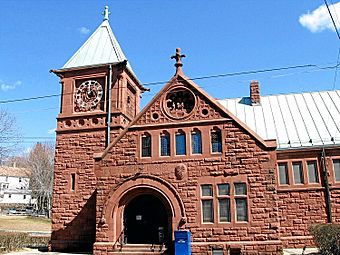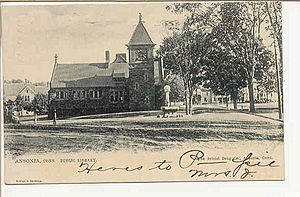Ansonia Library facts for kids
Quick facts for kids |
|
|
Ansonia Library
|
|
 |
|
| Location | 53 South Cliff St., Ansonia, Connecticut |
|---|---|
| Area | 0.5 acres (0.20 ha) |
| Built | 1892 |
| Built by | August Budde & W. George Calder |
| Architect | George Keller |
| Architectural style | Richardsonian Romanesque |
| NRHP reference No. | 85001828 |
| Added to NRHP | August 23, 1985 |
The Ansonia Library is the public library for the city of Ansonia, Connecticut. It is located at 53 South Cliff Street. The library is housed in a very special building. It was designed by a famous architect named George Keller. The building was finished in 1892. It was a gift from Caroline Phelps Stokes. This historic building is listed on the National Register of Historic Places. This means it's an important landmark.
The Library's Unique Design
The Ansonia Library building stands in a neighborhood with many homes. It is on a corner where two streets meet. The building is made of strong, reddish-brown stone. This stone is called brownstone. It was built in a style known as Richardsonian Romanesque. This style often features large, rounded arches. It also uses heavy stone walls.
What Makes It Special?
The library building has a unique shape. It has a tall, square tower on one side. This tower has a clock near the top. It also has a pointed copper roof. The main entrance is in the middle of the front. You walk under a big, round arch to get inside. Above the entrance, there is a round window. This window is called a rose window.
A Special Gift to Ansonia
The Ansonia Library building was a gift from Caroline Phelps Stokes. She wanted to honor her parents. She also wanted to remember her grandfather, Anson Greene Phelps. He was a very important person in the area. He started the Ansonia Brass Works. The city of Ansonia is even named after him!
Caroline Phelps Stokes bought the land for the library. The building was completed in 1892. It took four years for the library to officially become part of the city. There were some discussions about how the library would be managed. They also needed to make sure there was money to keep it running. In 1960, a new part was added to the building. This addition helped the library grow.
 | May Edward Chinn |
 | Rebecca Cole |
 | Alexa Canady |
 | Dorothy Lavinia Brown |




